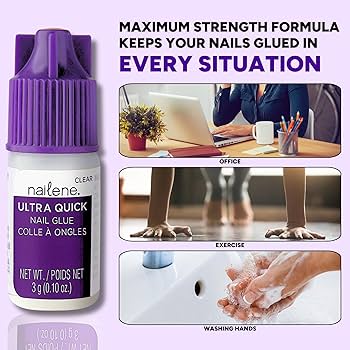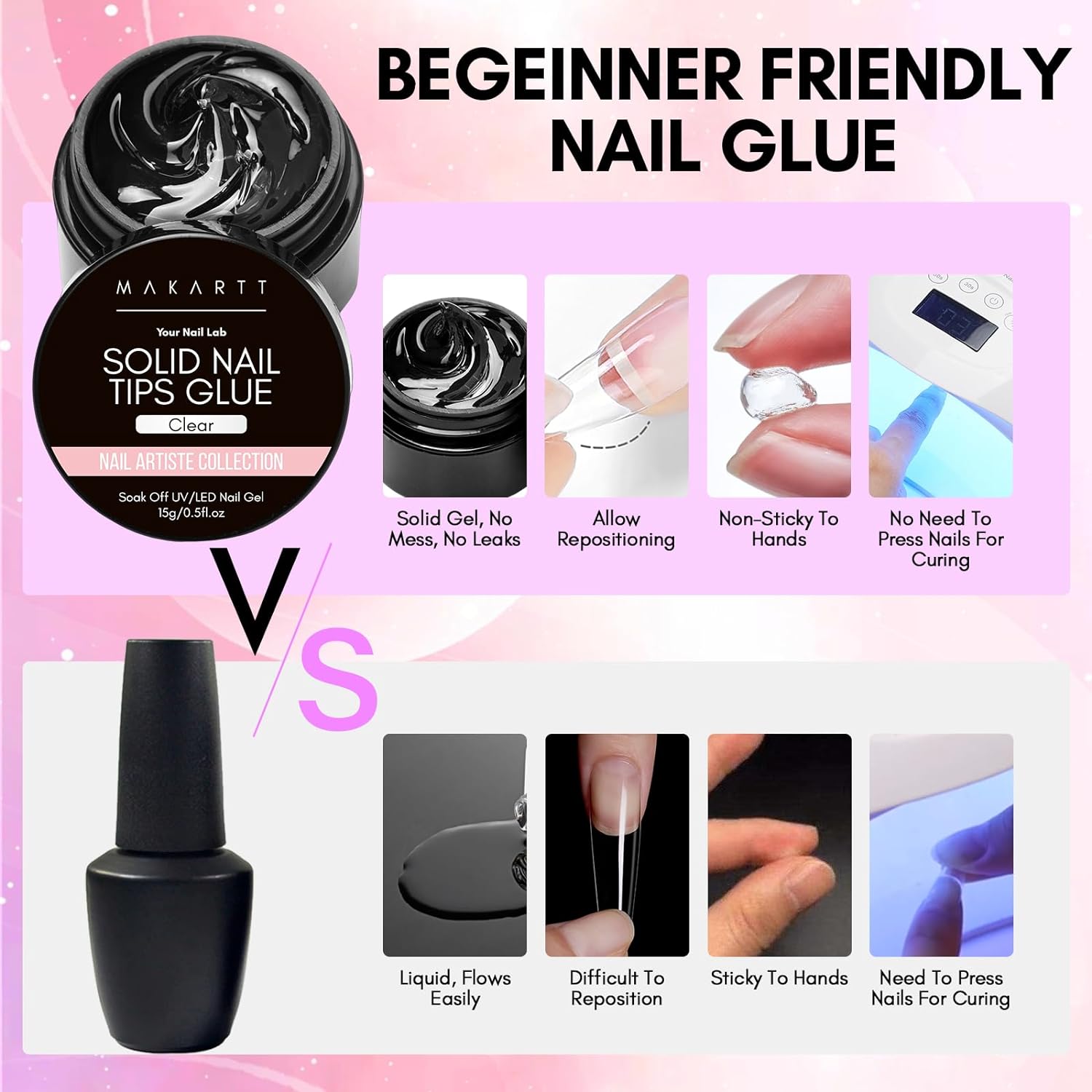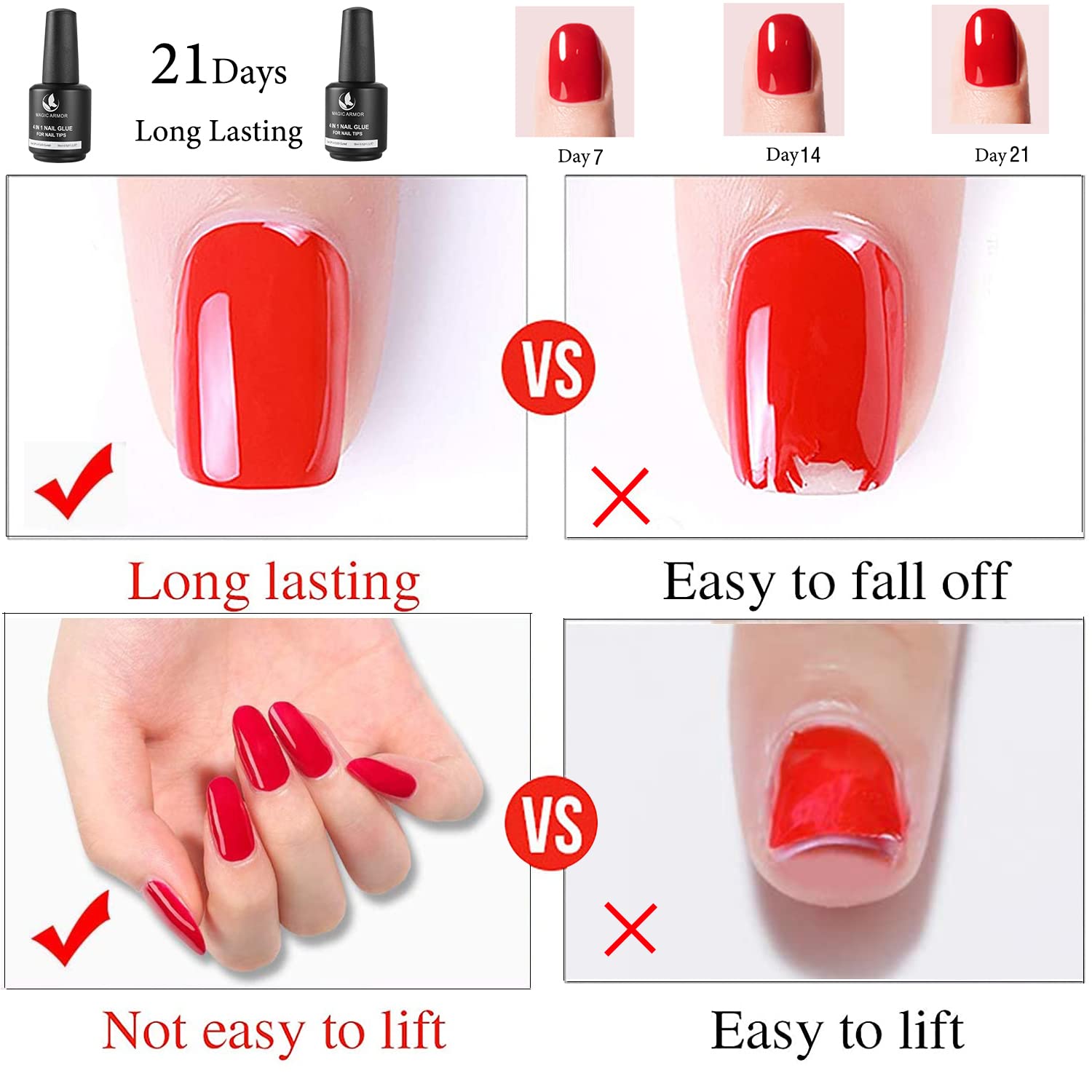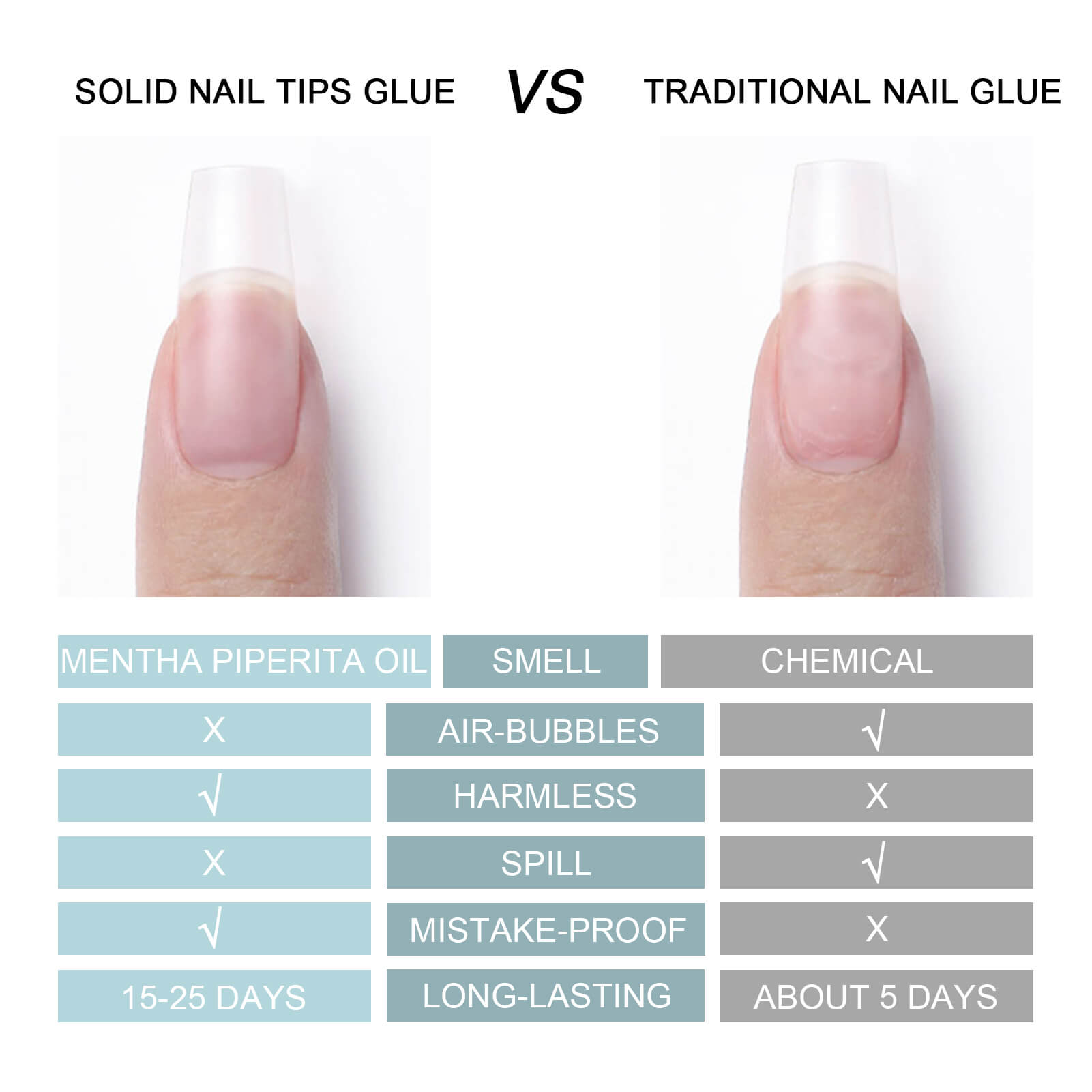Super Glue and Nail Glue Overview
What is Super Glue?
Super glue, also known as cyanoacrylate glue, is a quick-drying adhesive that’s super popular because it can stick a bunch of different materials together really well. You can use it on:
- Plastics
- Metals
- Wood
- Ceramics
It’s a go-to for lots of home repairs and crafts because it bonds quickly. But watch out—it can be tough to remove once it’s dried and might irritate your skin if you touch it.
What is Nail Glue?
Nail glue is specially made for nails, either real or fake. It’s usually not as strong as super glue since it’s designed to be safer and more flexible to protect delicate nail surfaces. You usually use nail glue for:
- Putting on fake nails
- Repairing broken real nails
- Creating fancy nail designs
Nail glue often has ingredients that help keep your nails healthy, making it a gentler choice than super glue. With good nail glue, you can make sure your nails last longer while avoiding the risks that come with stronger adhesives.

Composition and Strength
Super Glue Composition
Super glue mainly has methyl cyanoacrylate, which makes it a quick-acting adhesive known for:
- Strength: It creates really strong bonds with different materials.
- Quick Setting: It bonds super fast, in just seconds, making it great for urgent fixes.
- Versatility: Works well on a range of materials like plastics and metals.
But be careful—the strong formula can irritate your skin or even cause burns if not handled properly.
Nail Glue Composition
On the flip side, nail glue usually has ethyl cyanoacrylate that’s made to be safe for nails. It has some key traits, like:
- Gentleness: It’s made to be safe for natural nails and skin.
- Flexibility: It stays more pliable, lowering the chances of breaking or chipping.
- Enhanced Formulations: Some nail glues even have extra stuff to help your nails grow and stay healthy.
Strength Comparison
When it comes to strength and how long the bond lasts, super glue often takes the cake because it’s super strong. But for nails, nail glue is the way to go because:
- It gives a safe and gentle hold.
- It balances durability with flexibility, which means less chance of hurting natural nails.
For nail jobs, nail glue is really the best pick, giving safety and just enough strength for artificial nails and repairs.

Usage and Apps
Common Uses of Super Glue
Super glue is known for its strong bond and is a go-to for many projects at home and in businesses. Some common uses are:
- Household Repairs: Fixing broken ceramics, glass, and plastics.
- DIY Projects: Crafting or building models and art.
- Electronics: Bonding bits in devices and small machines.
- Jewelry Repair: Temporarily mending broken jewelry pieces.
Many people like how quick it dries, which is great for fast fixes when you’re in a hurry.
Common Uses of Nail Glue
Nail glue is made just for nail stuff. Some of its main uses include:
- Attaching Fake Nails: Securing artificial nails or tips to your natural ones.
- Fixing Natural Nails: Repairing broken or chipped nails without hurting the skin.
- Nail Art: Sticking on embellishments like rhinestones or cool designs.
Nail glue is usually gentler on the skin and nails, which is why many nail fans like it.
Compatibility with Different Materials
While super glue does well with many materials like:
- Metal
- Plastic
- Wood
- Ceramics
Nail glue is specifically made for:
- Natural Nails
- Fake Nails
Using the right glue for every job is key to getting the best results without risking damage. No matter if it’s for a craft or nail care, picking the right adhesive is the way to go for success.

Drying Time and Setting
Super Glue Drying Time
Super glue is famous for its really fast drying time. It can bond stuff in just seconds—usually around 10 to 30 seconds. That’s why it’s great for quick fixes or DIY projects. But while it sets up quickly, it might take a full 24 hours to completely cure based on the material and the environment.
Nail Glue Drying Time
Nail glue also dries fast but usually takes a bit longer than super glue. Most nail adhesives will bond in about 30 seconds to 1 minute. After that, nail glue could need up to 2 hours to fully set, especially when using a curing lamp for gel nails. This bit of extra time lets the adhesive stay flexible as it sets, so it moves with your nails as they naturally flex.
Setting Process Comparison
When you’re comparing how they set, super glue is all about being fast, making it perfect for quick fixes. Nail glue, however, tends to set slowly and can adapt to the unique needs when working with nails. If you’re racing to fix something at home or making sure your manicure looks just right, knowing these differences can help you pick the right glue for your project.

Removal and Cleanup
Removing Super Glue
Getting rid of super glue can be tricky because it’s really strong, but you can manage it with the right tricks. Check out these methods:
- Acetone: This is nail polish remover, and it’s great for breaking down super glue. Soak a cotton ball in acetone and hold it over the area for a few minutes to help dissolve the glue.
- Warm Soapy Water: Soaking the area with warm soapy water for about 10-15 minutes can loosen the glue, which makes it easier to peel off.
- Oil or Butter: In a pinch, using oil (like olive oil) or butter can soften the glue to help you remove it easier.
Removing Nail Glue
Nail glue is usually simpler to remove than super glue. Here are some easy techniques:
- Acetone: Just like super glue, acetone is magic for nail glue too. Soaking your nails in acetone will dissolve the adhesive without much hassle.
- Warm Water Soak: Soaking your nails in warm soapy water for about 10 minutes can help loosen the nail glue for an easier takedown.
- Gentle Scraping: If there’s any leftovers after soaking, gently scrape it off with a manicure tool.
Cleanup Comparison
For cleanup, nail glue is usually easier since it dissolves quicker in acetone and warm water. Super glue might leave behind some residue that takes more effort to clean up. Using the right removal method for each adhesive helps make cleanup easier and keeps damage to your skin or nails to a minimum. Remember to be patient!
Toxicity and Safety
Health Risks of Super Glue
Super glue works great for sticking things, but it can come with health issues. The main ingredient, methyl cyanoacrylate, can cause skin irritation and even chemical burns in some cases. Plus:
- Inhalation Risks: The fumes can be harmful to breathe in and may cause breathing troubles.
- Skin Bonds: This glue can stick to your skin really well, making it a pain if there’s an accident.
Many people have learned about these issues the hard way during home projects.
Health Risks of Nail Glue
Nail glue usually has ethyl cyanoacrylate and is seen as safer for nail use. But it’s still got some risks:
- Allergic Reactions: Some folks might have allergies that lead to redness or swelling.
- Skin Irritation: Touching it can irritate your skin, especially if it’s sensitive.
Safety Tips for Using Them
To stay safe while using these glues, keep these tips in mind:
- Ventilation: Always work in a space with good airflow to dodge inhaling fumes.
- Protective Gear: Wear gloves and safety glasses to avoid contact with skin and eyes.
- Careful Application: Put it on with care to avoid overspilling. If you get it on your skin, wash it off with soap and water right away.
Following these steps can help lower health risks while you enjoy the benefits of these adhesives.
Cost and Availability
Super Glue Price Range
Super glue is easy to find, with prices usually between $2 to $10 depending on the brand and size. Basic single tubes tend to be cheaper, while special formulas or multi-packs might be pricier. Here’s a quick breakdown:
- Basic single tubes: $2 – $4
- Multi-pack options: $5 – $10
- Specialty formulas (like ones for certain materials): $8 – $12
With this range, you’re sure to find a super glue that fits your budget and repairs.
Nail Glue Price Range
Nail glue has a similar price range, usually between $5 to $15. Brands for professional use might offer small bottles that are perfect for DIY fans and nail artists. Here are some pricing details:
- Basic nail glue: $5 – $7
- Gel nail glue: $8 – $12
- Professional or specialty glues: $12 – $15
Getting a good nail glue can really help your manicure last longer.
Where to Buy
Both super glue and nail glue are easy to find in:
- Local stores: Craft shops, drugstores, and supermarkets usually carry both types of adhesives.
- Online: Big retail sites like Amazon, Walmart, and specialty beauty stores have a ton of options.
Online shopping can give you more choices and sometimes better prices, so you can find the right glue for your needs.
Wrapping It Up
Key Differences Recap
To sum it up, even though super glue and nail glue might look alike, they have some key differences that set them apart. Here’s a quick recap:
- Chemical Composition: Super glue mainly has methyl cyanoacrylate, while nail glue usually has ethyl cyanoacrylate, making it easier on natural nails.
- Intended Use: Super glue is for various types of bonding, while nail glue is designed specifically for nails, ensuring safety and suitability for fake nails or natural nail repairs.
- Bond Strength: Super glue creates tougher bonds, while nail glue is more flexible, which helps prevent damage to delicate nails.
Final Thoughts on Choosing the Right Glue
In the end, picking between super glue and nail glue depends on what you need it for. If it’s about nails, stick with nail glue for safety and the best results. Although super glue might do the trick in a pinch, be aware that the risks to your nails and skin might be more than the benefits. Always keep your health in mind and go for adhesives that suit your needs!

Leave a Reply